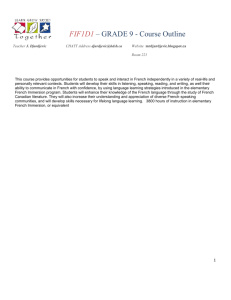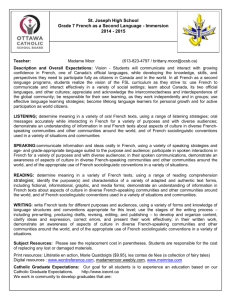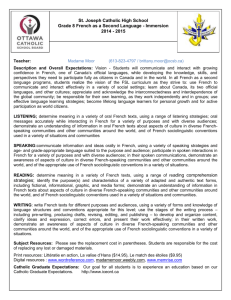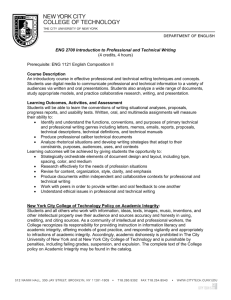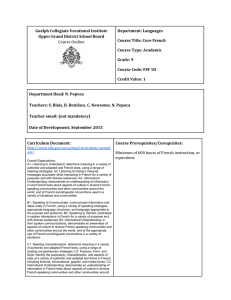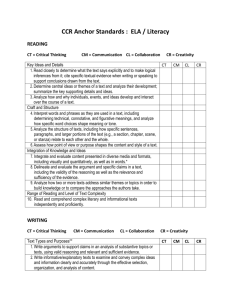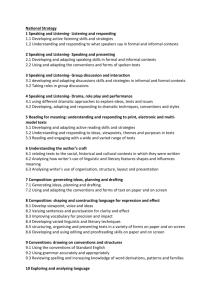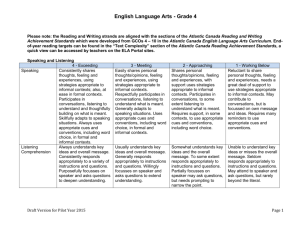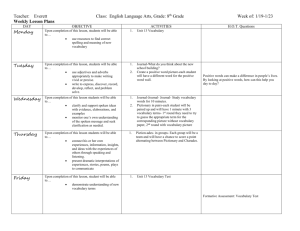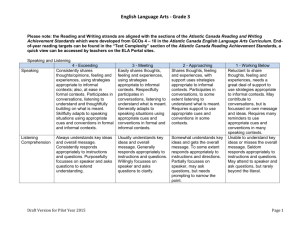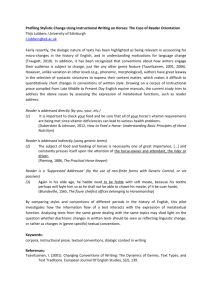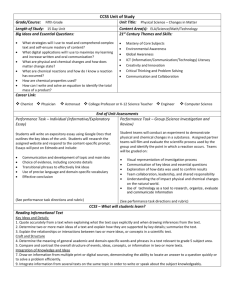Course Outline
advertisement
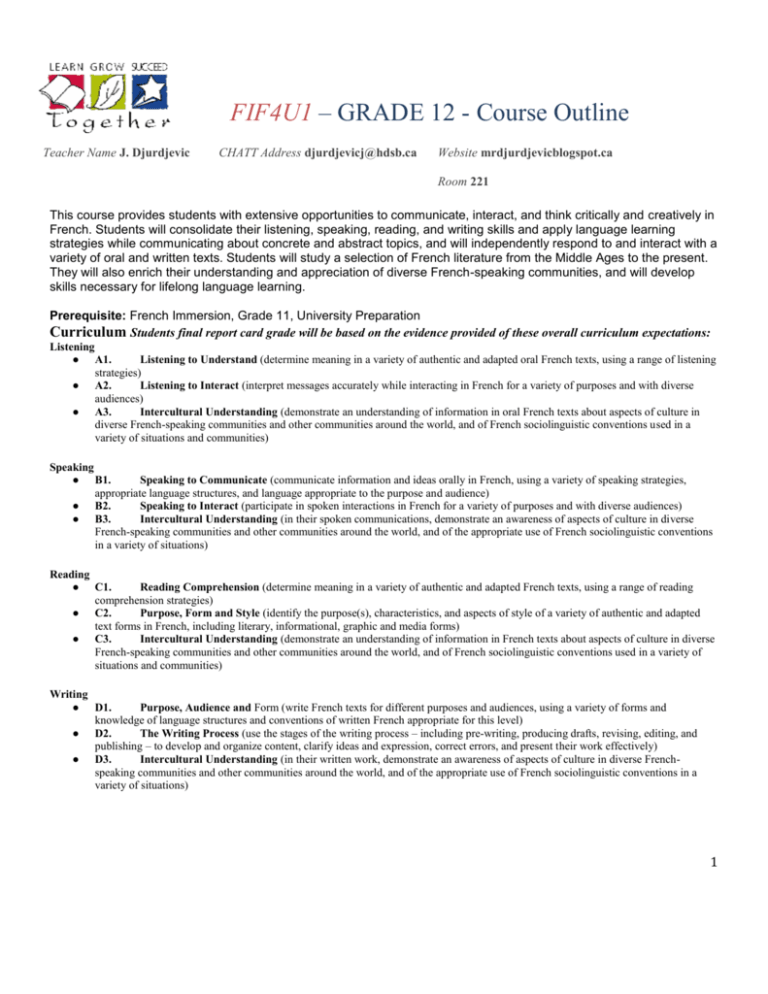
FIF4U1 – GRADE 12 - Course Outline Teacher Name J. Djurdjevic CHATT Address djurdjevicj@hdsb.ca Website mrdjurdjevicblogspot.ca Room 221 This course provides students with extensive opportunities to communicate, interact, and think critically and creatively in French. Students will consolidate their listening, speaking, reading, and writing skills and apply language learning strategies while communicating about concrete and abstract topics, and will independently respond to and interact with a variety of oral and written texts. Students will study a selection of French literature from the Middle Ages to the present. They will also enrich their understanding and appreciation of diverse French-speaking communities, and will develop skills necessary for lifelong language learning. Prerequisite: French Immersion, Grade 11, University Preparation Curriculum Students final report card grade will be based on the evidence provided of these overall curriculum expectations: Listening ● A1. Listening to Understand (determine meaning in a variety of authentic and adapted oral French texts, using a range of listening strategies) ● A2. Listening to Interact (interpret messages accurately while interacting in French for a variety of purposes and with diverse audiences) ● A3. Intercultural Understanding (demonstrate an understanding of information in oral French texts about aspects of culture in diverse French-speaking communities and other communities around the world, and of French sociolinguistic conventions used in a variety of situations and communities) Speaking ● B1. Speaking to Communicate (communicate information and ideas orally in French, using a variety of speaking strategies, appropriate language structures, and language appropriate to the purpose and audience) ● B2. Speaking to Interact (participate in spoken interactions in French for a variety of purposes and with diverse audiences) ● B3. Intercultural Understanding (in their spoken communications, demonstrate an awareness of aspects of culture in diverse French-speaking communities and other communities around the world, and of the appropriate use of French sociolinguistic conventions in a variety of situations) Reading ● C1. Reading Comprehension (determine meaning in a variety of authentic and adapted French texts, using a range of reading comprehension strategies) ● C2. Purpose, Form and Style (identify the purpose(s), characteristics, and aspects of style of a variety of authentic and adapted text forms in French, including literary, informational, graphic and media forms) ● C3. Intercultural Understanding (demonstrate an understanding of information in French texts about aspects of culture in diverse French-speaking communities and other communities around the world, and of French sociolinguistic conventions used in a variety of situations and communities) Writing ● D1. Purpose, Audience and Form (write French texts for different purposes and audiences, using a variety of forms and knowledge of language structures and conventions of written French appropriate for this level) ● D2. The Writing Process (use the stages of the writing process – including pre-writing, producing drafts, revising, editing, and publishing – to develop and organize content, clarify ideas and expression, correct errors, and present their work effectively) ● D3. Intercultural Understanding (in their written work, demonstrate an awareness of aspects of culture in diverse Frenchspeaking communities and other communities around the world, and of the appropriate use of French sociolinguistic conventions in a variety of situations) 1 Your Report Card Grade will be determined as follows: Term work: 70% of your grade will be based on all of the evidence you have provided. It will reflect your most consistent level of achievement with special consideration given to more recent evidence. 17.5% Knowledge & Understanding: Knowledge of content (e.g., vocabulary and expressions; concepts, opinions, ideas, facts; language conventions; aspects of culture). Understanding of content (e.g., concepts, ideas, opinions, and facts and their relationship to forms; language structures and strategies; forms and characteristics of texts) 17.5% Thinking: Use of planning skills (e.g., establishing a focus; setting goals; generating ideas; formulating questions; researching and organizing information; contextualizing and elaborating on ideas; selecting and using strategies and resources). Use of processing skills (e.g., predicting; inferring; discussing; interpreting; summarizing; analyzing; evaluating; constructing and defending an argument; revising and restructuring). Use of critical/creative thinking processes e.g., using language learning, inquiry, and problem solving strategies; prioritizing; critiquing; hypothesizing; synthesizing; forming and justifying conclusions). 17.5% Communication: Expression and organization of ideas and information (e.g., clear expression, logical organization)in oral, visual, and/or written forms. Communication for different audiences (e.g., self, peers, teacher, community members) and purposes (e.g., to interact, discuss, collaborate; to inform, raise awareness, explain, instruct; to entertain, perform; to persuade; to express feelings and ideas; to solve problems) in oral, visual, and/or written forms. Use of conventions, vocabulary, and terminology of the discipline in oral, visual, and/or written forms (e.g., elements of style and usage; phrasing and punctuation conventions; appropriate language conventions in particular social and cultural contexts). 17.5% Application: Application of knowledge and skills(e.g., strategies, concepts, processes)in familiar contexts. Transfer of knowledge and skills(e.g., strategies, concepts, processes)to new contexts. Making connections within and between various contexts (e.g., between personal, global, cultural, historical, and/or environmental contexts; between French and other languages; between the school and other social contexts) Final Evaluation: 30% of your grade will be determined at the end of the course. 15% Performance Task - includes overall curriculum expectations from Listening and Speaking. 15% Exam 2 hours in total length - includes Reading Comprehension; includes Writing from a prompt for a purpose, audience and form. Your final grade will be calculated by combining your Term (70%) grade and your Exam and Performance Task Evaluations (30%). Academic Standards It is your responsibility to provide evidence of your learning within established timelines. Due dates for assignments and the scheduling of tests will be communicated well in advance to allow you to schedule your time. If you aren’t going to be able to follow an agreed upon timeline you should demonstrate your responsibility and organizational skills by discussing with your teacher the challenges you’re facing as far in advance of the deadline as possible. It is your responsibility to be academically honest in all aspects of your schoolwork so that the marks you receive are a true reflection of your achievement. Plagiarism is using the words, ideas or work of someone else without giving appropriate credit to the original creator. This is a form of cheating. Consequences for not meeting these academic standards may include: ● ● ● ● ● Reporting the issue to your parents; Requiring you to complete the original or alternative work after school or during your lunch hour; Requiring you to complete an alternative assignment; Suspension; Assigning a “zero” for an assignment not completed prior to an agreed upon closure date; 2 ● Mark deduction of 5% / day. NOTE: the complete HDSB policies and administrative procedures for “Lates and Missed Assignments” and “Cheating and Plagiarism” policies may be found at www.hdsb.ca 3 Learning Skills & Work Habits These learning skills and work habits will be taught, assessed and evaluated throughout the course. 4
